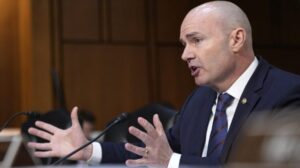Congress
How the megabill could fall apart
Republican leaders are expecting to finish up their domestic-policy megabill the same way they’ve advanced it this far: by tweaking their plans for President Donald Trump’s legislative agenda and daring holdouts to vote against it.
It might work, and GOP leaders are projecting confidence that the bill will land on Trump’s desk in time to meet their arbitrary July 4 target. Senate Majority Leader John Thune said Friday he expects his chamber to start voting as soon as Saturday.
But there are reasons the deadline could slip, and several of them were on display this week as Republicans dug in for the final scramble of negotiations.
For one, members continue to fight jealously to keep personal priorities in the bill — including parts of a $4 trillion package of tax cuts set to affect virtually the entire U.S. economy. Meanwhile, other lawmakers who have made the megabill into an ideological litmus test on federal spending and budget deficits are facing a put-up-or-shut-up moment after repeatedly drawing red lines and then moving forward with the legislation anyway.
Finally, a handful of key lawmakers are facing what could be existential political stakes as they brace for tough re-election contests in next year’s midterms. Many are balking at having to vote on cutbacks to safety-net programs, clean-energy projects and other federal assistance their states and constituents rely on.
Together, it’s turned the megabill’s endgame into a high-wire act — and Thune is keeping the pressure on, expecting his members will want to stay on the rope.
“We’ve cussed it. We’ve discussed it,” Sen. John Kennedy (R-La.) said Friday. “But we’re gradually going from thoughtful, rational deliberation into the foothills of jackassery. I mean, we’re talking about the same thing over and over and over.”
Thune, along with Trump and Speaker Mike Johnson, have all calculated that allowing more debate will only work against them. They’ve already used the threat of a federal default later this summer to move the process along — the bill includes a debt-ceiling increase — but the Independence Day deadline has emerged as a tantalizing symbolic target.
Problem is, with groups of members digging in, the state of the negotiations isn’t necessarily jibing with that timeline. Thune wouldn’t say Friday whether he had the votes to even start debate: “We’ll find out.”
Among the biggest problems for Thune going into Saturday are four GOP fiscal hawks: Sen. Rand Paul of Kentucky is an all-but-guaranteed “no” vote, while Sens. Mike Lee of Utah, Ron Johnson of Wisconsin and Rick Scott of Florida are each in close touch with Trump and pledging to act in unison.
All of them have made dire warnings about the state of the nation’s finances, and they have pushed for much deeper spending cuts than what has been on offer. They have also been coordinating with members of the House Freedom Caucus, the hard-right group that has made similar fiscal demands.
Every Freedom Caucus member save for Rep. Andy Harris (R-Md.), its chair, has voted to advance the megabill. But they’ve been strategizing about how to bend the legislation in their direction and trying to warn they will vote against the Senate bill if it moves too far in the other direction.
Rep. Eric Burlison of Missouri, one of 30 House Republicans who warned senators to abide by the House bill’s fiscal framework, said Friday he remained in a dug-in “no” vote on the Senate bill. He said he was even more adamant about his position given the Senate parliamentarian had effectively vetoed a provision he secured that would make it easier to obtain rifles and silencers.
“They just need to understand that if they don’t meet that and they send us back something that blows up the deficit, it’s not going to pass — period,” Burlison said. “And we mean it.”
Texas Rep. Chip Roy, a ringleader of the fiscal conservatives, told reporters Friday there’s a “good number” of ”no” votes among Republicans in the House, “and I think the Senate knows that.”
“I can’t go back to my people and say we increased the deficit a trillion dollars,” he said.
White House officials have ratcheted up their efforts to win over the holdouts. Deputy chief of staff Stephen Miller has been calling Freedom Caucus members this week to hear out their concerns. So far, he’s largely been in “listening mode,” according to two Republicans granted anonymity to discuss the private conversations.
Trump himself is “more fielding calls than making them” at this point, according to a senior White House official granted anonymity to describe the president’s lobbying. He met Thursday with Johnson and Thune, and the official said the individual whipping of members would begin soon enough.
The message will be simple, the person said: “You can vote to end your career or not.”
That’s exactly what’s on the minds of several in-cycle senators, except they fear it’s a yes vote that could cost them re-election next year.
Sen. Thom Tillis of North Carolina openly warned his colleagues this week he will lose his reelection bid if they move forward with Medicaid provisions as currently drafted — in particular a curtailing of medical provider taxes, the mechanism the vast majority of states use to finance their Medicaid programs.
“Trust me when I tell you, my Republican colleagues and leadership of the legislature are not going to raise taxes to fill the gap, and even if they could, the number is too high,” Tillis said Friday, emphasizing he would not vote to start debate on the bill until the matter is addressed.
Sens. Bill Cassidy of Louisiana and Susan Collins of Maine, who are up for re-election next year, and Sen. Lisa Murkowski of Alaska, who is up in 2028, are also closely following the Medicaid language. Leaders have so far offered a $15 billion fund to offset the provider tax changes and protect vulnerable hospitals, but Collins is pushing for $100 billion.
They have taken heart from reports that Trump is sympathetic to their position and would prefer the Senate retreat to the less drastic House provider tax proposal. But GOP leaders are intent on preserving the hundreds of billions of dollars in savings attached to the provision — in part to preserve a trio of permanent business tax breaks backed by key members of the Senate Finance Committee.
They’re also facing a crunch from the small but vocal group of blue-state House Republicans pushing for a larger state-and-local-tax deduction. Their demands could add another $350 billion in cost to the Senate bill, though there is a tentative deal to cut that figure in half.
After meeting with Trump Thursday, Thune said he believes the president has no strong attachment to the Medicaid provision and just wants whatever bill can get to his desk. He’s privately told Senate Republicans that he believes the House will take up and pass whatever the Senate sends over.
In other words, even if Thune’s gamble succeeds on his side of the Capitol, Johnson might soon be throwing the dice himself.
“Mike is nervous as a pregnant nun right now — he doesn’t know if he can get what we’re doing past his House,” Kennedy said. “He wanted us understandably not to touch a thing in the House bill — that wasn’t going to happen in this lifetime.”
Dasha Burns, Cassandra Dumay and David Lim contributed to this report.
Congress
‘Kill shot’: GOP megabill targets solar, wind projects with new tax
Senate Republicans stepped up their attacks on U.S. solar and wind energy projects by quietly adding a provision to their megabill that would penalize future developments with a new tax.
That new tax measure was tucked into the more than 900-page document released late Friday that also would sharply cut the tax credits in the Inflation Reduction Act for solar and wind projects. Those cuts to the IRA credits were added after a late-stage push by President Donald Trump to crack down further on the incentives by requiring generation projects be placed in service by the end of 2027 to qualify.
The new excise tax is another blow to the fastest-growing sources of power production in the United States, and would be a massive setback to the wind and solar energy industries since it would apply even to projects not receiving any credits.
“It’s a kill shot. This new excise tax on wind and solar is designed to fully kill the industry,” said Adrian Deveny, founder and president of policy advisory firm Climate Vision, who helped craft the climate law as a former policy director for Democratic Senate Leader Chuck Schumer.
Analysts at the Rhodium Group said in an email the new tax would push up the costs of wind and solar projects by 10 to 20 percent — on top of the cost increases from losing the credits.
“Combined with the likely onerous administrative reporting burden this provision puts in place, these cost increases will lead to even lower wind and solar installations. The impacts of this tax would also flow through to consumers in the form of higher electricity rates,” Rhodium said.
The provision as written appears to add an additional tax for any wind and solar project placed into service after 2027 — when its eligibility for the investment and production tax credits ends — if a certain percentage of the value of the project’s components are sourced from prohibited foreign entities, like China. It would apply to all projects that began construction after June 16 of this year.
The language would require wind and solar projects, even those not receiving credits, to navigate complex and potentially unworkable requirements that prohibit sourcing from foreign entities of concern — a move designed to promote domestic production and crack down on Chinese materials.
In keeping with GOP support for the fossil fuel industry, the updated bill creates a new production tax credit for metallurgical coal, which is used in steelmaking.
Congress
Elon Musk renews megabill attacks
Elon Musk is once again bashing the Republican megabill.
Weeks after an initial tirade against the legislation, the former top White House staffer and current richest man in the world wrote Saturday on X that the “latest Senate draft bill will destroy millions of jobs in America and cause immense strategic harm to our country!”
“Utterly insane and destructive,” he added. “It gives handouts to industries of the past while severely damaging industries of the future.”
The bill significantly cuts subsidies for clean power sources like wind and solar, along with tax credits for buying electric vehicles and instead includes incentives for the coal industry.
Musk has intervened before to tank a major spending bill. The billionaire torpedoed a compromise government spending bill in December by repeatedly posting in opposition to it. This caused a number of Republicans to back away and nearly spaked a government shutdown.
At the time, Musk had far more influence as a close Trump ally and as the largest donor in support of Trump’s re-election bid. His influence in the GOP has waned after his controversial stint atop the Department of Government Efficiency initiative created repeated hassles for the White House.
Congress
House could vote on megabill as soon as Tuesday
House Majority Leader Steve Scalise told GOP members on a Saturday conference call to prepare for votes Tuesday evening or Wednesday on the sweeping Republican megabill, according to three people who were on the call and were granted anonymity to describe it.
Scalise and Speaker Mike Johnson addressed House Republicans as GOP leaders in the Senate raced to tweak and advance their version of the megabill. Johnson said on the call he has been working with Senate Republican leaders to shape the bill so the version that emerges from the other chamber can be passed in the House without changes and sent to President Donald Trump for enactment.
The leaders have been planning to iron out some issues in a final amendment before Senate passage, but Senate GOP leaders have pushed back hard on reversing deep Medicaid cuts — something dozens of House Republicans are concerned about.
Johnson also members to bring any remaining concerns directly to their GOP senators and to the White House — and to not air those grievances in public. House GOP leadership said they would stick with a promise to give members 48 hours notice of a vote so that lawmakers have adequate time to return to Washington.
House GOP leaders did not take questions on the call.
-

 The Josh Fourrier Show8 months ago
The Josh Fourrier Show8 months agoDOOMSDAY: Trump won, now what?
-
Uncategorized8 months ago
Bob Good to step down as Freedom Caucus chair this week
-

 Politics8 months ago
Politics8 months agoWhat 7 political experts will be watching at Tuesday’s debate
-

 Politics8 months ago
Politics8 months agoHow Republicans could foil Harris’ Supreme Court plans if she’s elected
-
Economy8 months ago
Fed moves to protect weakening job market with bold rate cut
-
Economy8 months ago
It’s still the economy: What TV ads tell us about each campaign’s closing message
-

 Politics8 months ago
Politics8 months agoRFK Jr.’s bid to take himself off swing state ballots may scramble mail-in voting
-
Uncategorized8 months ago
Johnson plans to bring House GOP short-term spending measure to House floor Wednesday








